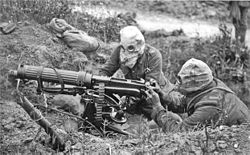
Back Актәи адунеизегьтәи аибашьра Abkhazian Eerste Wêreldoorlog Afrikaans Erster Weltkrieg GSW የመጀመሪያው የዓለም ጦርነት Amharic Primera Guerra Mundial AN Fyrst Woruldgūþ ANG الحرب العالمية الأولى Arabic لحرب لعالمية لولة ARY الحرب العالميه الاولانيه ARZ প্ৰথম বিশ্বযুদ্ধ Assamese
| World War I | |||||||||
|---|---|---|---|---|---|---|---|---|---|
| |||||||||
| |||||||||
| Belligerents | |||||||||
Allied Powers:
|
Central Powers:
| ||||||||
| Commanders and leaders | |||||||||
| See Main Allied leaders | See Main Central leaders | ||||||||
| Casualties and losses | |||||||||
|
| ||||||||
World War I[b] or the First World War (28 July 1914 – 11 November 1918), also known as the Great War, was a global conflict between two coalitions: the Allies (or Entente) and the Central Powers. Main areas of conflict included Europe and the Middle East, as well as parts of Africa and the Asia-Pacific. There were important developments in weaponry including tanks, aircraft, artillery, machine guns, and chemical weapons. One of the deadliest conflicts in history, it resulted in an estimated 30 million military casualties, plus another 8 million civilian deaths from war-related causes and genocide. The movement of large numbers of people was a major factor in the deadly Spanish flu pandemic.
The causes of World War I included the rise of Germany and decline of the Ottoman Empire, which disturbed the long-standing balance of power in Europe, imperial rivalries, and shifting alliances and an arms race between the great powers. Growing tensions between the great powers and in the Balkans reached a breaking point on 28 June 1914, when Gavrilo Princip, a Bosnian Serb, assassinated the heir to the Austro-Hungarian throne. Austria-Hungary blamed Serbia, and declared war on 28 July. After Russia mobilised in Serbia's defence, Germany declared war on Russia and France, who had an alliance. The United Kingdom entered after Germany invaded Belgium, and the Ottomans joined the Central Powers in November. Germany's strategy in 1914 was to quickly defeat France then transfer its forces to the east, but its advance was halted in September, and by the end of the year the Western Front consisted of a near-continuous line of trenches from the English Channel to Switzerland. The Eastern Front was more dynamic, but neither side gained a decisive advantage, despite costly offensives. Italy, Bulgaria, Romania, Greece and others entered the war from 1915 onward.
Major battles including those at Verdun, the Somme, and Passchendaele, failed to break the stalemate on the Western Front. In April 1917, the United States joined the Allies after Germany resumed unrestricted submarine warfare against Atlantic shipping. Later that year, the Bolsheviks seized power in Russia in the October Revolution; Soviet Russia signed an armistice with the Central Powers in December, followed by a separate peace in March 1918. That month, Germany launched a spring offensive in the west, which despite initial successes left the German Army exhausted and demoralised. The Allied Hundred Days Offensive, beginning in August 1918, caused a collapse of the German front line. Following the Vardar Offensive, Bulgaria signed an armistice in late September. By early November, the Ottoman Empire and Austria-Hungary had each signed armistices with the Allies, leaving Germany isolated. Facing a revolution at home, Kaiser Wilhelm II abdicated on 9 November, and the war ended with the Armistice of 11 November 1918.
The Paris Peace Conference of 1919–1920, imposed settlements on the defeated powers. Under the Treaty of Versailles, Germany lost significant territories, was disarmed, and was required to pay large war reparations to the Allies. The dissolution of the Russian, German, Austro-Hungarian, and Ottoman Empires redrew national boundaries and resulted in the creation of new independent states including Poland, Finland, the Baltic states, Czechoslovakia, and Yugoslavia. The League of Nations was established to maintain world peace, but its failure to manage instability during the interwar period contributed to the outbreak of World War II in 1939.
Cite error: There are <ref group=lower-alpha> tags or {{efn}} templates on this page, but the references will not show without a {{reflist|group=lower-alpha}} template or {{notelist}} template (see the help page).





